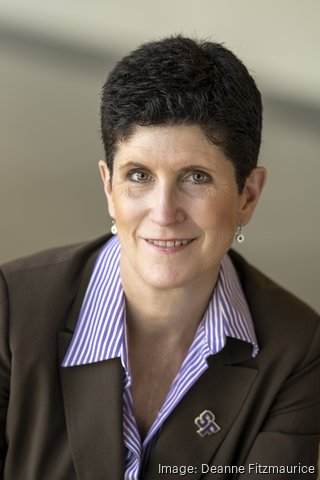Listen to this article 3 min
In a rare moment of candor from the higher-education sector, San Francisco State University President Lynn Mahoney did not mince words when she explained why the school is shifting its endowment's investment strategy to be more socially responsible. Her stance in a nutshell: The university has a progressive brand to maintain to keep its customers happy.
More specifically, the climate crisis and racial inequities are top of mind for young people and they are sick of "statements of solidarity," Mahoney said.
“In 2020, when our students were teenagers or high school students, there were probably double-digit days where they could not be outdoors in beautiful, northern California,” Mahoney said. “And then George Floyd — every few years we have another tragic murder. We get all agitated. We sign statements of solidarity, and then we don't do anything. Students are looking for a university that's acting on those things.”
Mahoney is onto something. Generation Z, largely thought to include individuals born between 1997 and 2012, is “deeply concerned about the state of the world,” according to Deloitte’s 2022 Gen Z and Millennial Survey. These concerns are driving young people’s behavior, including decisions about where they work or enroll in college.
Deloitte found that about two in five young people say that “they have rejected a job or assignment because it did not align with their values.” On the other hand, Deloitte’s survey found that “those who are satisfied with their employers’ societal and environmental impact, and efforts to create a diverse and inclusive culture, are more likely to want to stay with their employer for more than five years.”
That means the pressure is on employers and colleges alike to appeal to a shrinking pool of young candidates and potential students, due to declining birth rates following the 2008 recession.
While some colleges, like San Francisco State, are adopting practices and strategies that better align with Gen Z’s values, others are more reluctant to change course. Campus unionization and advocacy efforts are growing as a result. Students are pushing for fossil fuel divestment, equitable pay and treatment for campus workers, improved mental health resources and more. Student activism has contributed to a growing list of colleges divesting fossil fuels in recent years including Stanford University, Brown University, Cornell University and the University of California System.
The push continues on other campuses. Joshua Sisman, a student at Northeastern University in Boston who was involved in supporting the school’s dining workers’ union throughout a recent contract fight, told The Business Journals that he and his peers are concerned about the university's lack of a firm stance on fossil fuel divestment, and food insecurity among students enrolled at the private university, which has a $1.5 billion endowment. The university's student government last year conducted a survey that found about one in five Northeastern students skipped meals because of financial constraints, according to the student newspaper. The total cost to attend Northeastern before financial aid was $78,202 for the most recent academic year.
“I’m no mental health expert, but I do think if conditions were better suited to promoting a better environment, like if people weren’t worried about where they're going to get food or worried about paying for classes and people weren’t as stressed about the climate crisis, I'm sure (suicide incidents) wouldn’t happen as often,” Sisman said.
Northeastern spokeswoman Marirose Sartoretto pointed The Business Journals to online information about its dining offerings when asked for comment about how administrators were addressing food insecurity and said its endowment "does not have any direct investments in fossil fuel companies."
"Most endowments rely primarily on commingled funds that include investments from a broad range of economic sectors," Sartoretto said.
Back at San Francisco State, Mahoney said she is more interested in how her university compares to others in terms of economic mobility opportunities, rather than U.S. News & World Report “best colleges” rankings, which “only demonstrate how wealthy your students are and how large your endowment is,” Mahoney said. Washington, D.C.-based think tank ThirdWay ranks San Fransisco State, which enrolls about 31,000 total students, No. 49 on its economic mobility index. Nearby Stanford University ranks No. 548 on the same list. San Francisco State, a public university, has a modest endowment (compared to selective, private higher-ed institutions) of $140.8 million. California residents, whom make up most of the university's enrollment, paid $27,463 to attend San Francisco State last year before financial aid.
Taking a more socially just investment approach with the school’s endowment funds aligns with the university’s overall mission, Mahoney said. To do that, the university said last month that it would divest from fossil fuel companies by 2025; achieve net-zero carbon emissions by 2040 and grow the portfolio's diversity of underrepresented funds and fund managers in the next five years.
“Our (updated investment policy) is just so much a part of our mission," Mahoney said. "It's just another spoke in the same wheel of everything that we do.”
Want more news on the business of higher education? Sign up here for The National Observer: Higher Education Edition.





